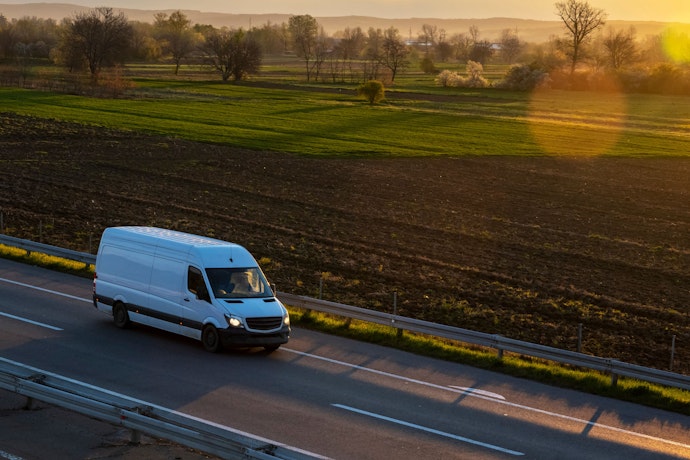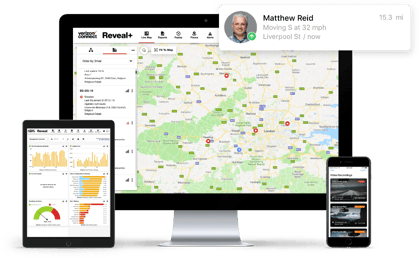2025 Fleet Technology Trends Report Europe
Find out how fleet management technologies can help improve the bottom line of your business.
Read more
Fleet management technology has become an indispensable tool for companies that operate vehicles, and its popularity is growing rapidly. According to research, “the installed base of fleet management systems in Europe will reach 26.5 million by 2027”(1).
This research also highlights that “the number of active fleet management systems deployed in commercial vehicle fleets in Europe was 14.8 million at the end of 2022”, which means an estimated growth of 79%. (2)
This technology is invaluable for companies that would benefit greatly from reduced fuel consumption, increased safety, more productive equipment, improved efficiency and sustainability, as well as many other factors. The company’s full potential could be realised quite easily if improvements were to be made in these areas.
In addition, this new solution can help companies prepare themselves for tougher competition and achieve their ambitious goals, which is especially useful for companies that want to stand out and work in a smarter manner.
Let’s see how fleet management technology helps companies strategically stay ahead of new challenges:
AI-backed video telematics with driver-facing and road-facing cameras is reshaping safety and efficiency for fleets. More and more businesses are relying on this technology to prioritise the safety of their teams and business.
In this sense, according to research “the installed base of video telematics in Europe will reach 2.5 million by 2027”. This piece also highlights that “the number of active video telematics systems reached 1.1 million at the end of 2022”, which means an estimated growth of 127%. (5)
And, this technology has seen remarkable growth in the UK. According to the latest Fleet Technology Trends Report in UK 2025, video telematics has grown by 20% from 2023 to 2024.
In light of this, our latest Fleet Technology United Kingdom 2025 showed that 74% of dashcams users improved safety, 73% reduced false claims, 65% reduced accident costs, 45% reduced insurance costs and 34% Improved managing daily operations
Also, 81% of survey respondents across all industries consider in-cab video “extremely” or “very beneficial” in all the industries to manage their fleets
Intelligent AI solutions dashcams video solutions can help promote safety and see what is happening on the road:
Electric vehicles (EVs) are the future of mobility. They’re a key piece of the puzzle when it comes to improving environmental sustainability, and we’re therefore seeing the shift towards EVs and new technologies gain ground. This applies to commercial vehicles, such as LCV and HGV fleets, and will shape the future of transportation.
Once electric vehicle prices become more affordable, the network infrastructure of vehicle charging points will expand, as will the range of vehicles. This may lead to more businesses and individuals adopting electric vehicles.
Advanced fleet management technology can help ensure a smooth transition to electric vehicles. This is because it clearly identifies your fleet’s needs and promotes to:
Becoming more sustainable is at the centre of all corporate strategies. The targets approved by governments to reduce atmospheric emissions mean that there will be new regulations for companies operating vehicles.
Improving a company’s carbon footprint, reducing all fleet vehicles emissions, and making the transition to more sustainable mobility by replacing ICE vehicles with EVs is at the forefront of conversation.
Among all of the measures taken by the UK Government we can highlight that they set “the most ambitious target to reduce carbon emissions by 68% by 2030 compared to 1990 levels” (3)
And although the UK Government “moved back the ban on the sale of new petrol and diesel cars by five years, so all sales of new cars from 2035 will be zero emission” (4.) It is “the only major economy to have set a target of 77% for 2035” (5) that they committed to meet.
Sources (3-4-5): https://www.gov.uk/government/news/pm-recommits-uk-to-net-zero-by-2050-and-pledges-a-fairer-path-to-achieving-target-to-ease-the-financial-burden-on-british-families
Implementing advanced fleet management technology can help a company comply with regulations. This is because it establishes a sustainability strategy that allows the company to meet the goals set by the governments of each country as well as to meet the goals that the company has set for itself.
Let’s take a look at some of the key areas that should be addressed in order to improve the sustainability of your business:
Be aware of your business’ carbon footprint: Know the carbon footprint of all your fleet vehicles.
Reduce all your vehicle emissions: The technology monitors the CO2 emissions that each vehicle and the overall fleet releases into the atmosphere.
Reduce your vehicle fleet fuel consumption: Get your company focused on reducing fuel consumption to improve sustainability and fuel economy.
Promote vehicle electrification: Determine which vehicles are suitable for transitioning to electric fleet vehicles or identify those that need replacing.
In all these areas, fleet management technology has proven very beneficial for improving sustainability in companies.
In fact, according to the latest Fleet Technology Trends Report, 46% of businesses in the UK have improved their sustainability since implementing a GPS fleet management solution.
Large fleets often find it challenging to reduce their daily operational costs. Managers in charge of large fleets know the importance of every pound that can be saved each day.
This is why it is necessary for fleet managers to establish a cost savings strategy and work out in which areas improvements can be made such as fuel economy, safety, and daily operating costs and anywhere else that can positively influence the overall result.
With the help of technology and by observing patterns over time, fleet managers can set realistic targets that can help decrease costs. This results in greater profitability for the company.
According to research, “a 10% reduction in fuel consumption can result in a 31% increase in profit” (4)
Now, think about a large fleet that has the potential to reduce their fuel consumption by 10% or more and what that could mean for the potential profitability of that business.
Compliance is key for any business. Fines for breaking regulations can be costly and can also result in the cargo and the vehicle being immobilised until the relevant driving and resting hours have been complied with.
In fact, one of the latest ROADPOL campaigns resulted in “245,500 trucks and 11,261 buses being checked. 38,589 violations were found (trucks: 79,152, buses: 8,796) during this week of checks, which means a 18% rise in truck violations compared to the previous year” (6).
They found out that for trucks most of the offences were to do with “exceeding driving time, tachograph settings or manipulation” (7).
A fleet management solution can help minimise the risk of non-compliance with tachograph regulations regarding driving times and rest periods.
In fact, 57% of GPS fleet management users in the UK improved tachograph and regulatory compliance last year.
Companies that rely on vehicles face many challenges, but by having the most advanced technologies on hand, they can achieve their goals and drive their business to the next level of efficiency, sustainability, productivity and excellence.
Also, if you want to see this innovative technology in action just request your free demo here.
Sources
Tags: Cost control, Compliance, Productivity & efficiency, Safety




Find out how our platform gives you the visibility you need to get more done.
Find out how fleet management technologies can help improve the bottom line of your business.
Read moreFind out how fleet management systems can help fleet managers make their fleets greener and more sustainable.
Read moreFind out about the many benefits of fleet management systems and what they can do for your business.
Read moreA GPS fleet management solution can help your company reduce operational costs and increase its competitiveness.
Read more